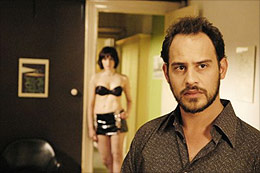
| HOME |
| NERVE |
| REVIEWS |
| ARCHIVE |
| EVENTS |
| LINKS |
| ABOUT US |
| CONTRIBUTORS |
| BACK ISSUES |
| CONTACT US |
 Atomised
(15)
Atomised
(15)
Directed by Oskar Roehler
Written by Michel Houellebecq (novel), Oskar Roehler (screenplay)
Screening at FACT from 21st July 2006
Reviewed by Adam Ford
There are billions of atoms in a human body, and each one is connected to all the others, enabling us to eat and breathe and find our way in society. There are billions of people in human society, yet many often feel alone, isolated and atomised. This is just the latest in an ever-accelerating number of films dealing with the subject of alienation. The last decade has seen Magnolia, Happiness, and the Oscar-winning Crash, to name just a few of the most famous examples. So what causes all the loneliness these days?
Michel Houllebecq and Oskar Roehler make the dubious claim that humanity is reaping the whirlwind sown by the flower power generation of the 1960s and early 70s. In an interview, Roehler declared that: “interpersonal relations and basic economic conditions have gradually declined, because mankind made a decision in favour of knowledge and research and thereby departed very far from religion”. These views - mixed with a dash of Aldous Huxley’s Brave New World - form the basis for the fascinating Atomised.
Half-brothers Bruno (Moritz Bleibtreu) and Michael (Christian Ulmen) have had very little in common since they were abandoned by their hippy mother (Nina Hoss) in early adolescence. Bruno has been a slave to his sexuality, whilst Michael has become a quiet-as-a-mouse molecular biologist. Apart from half their genes, the only thing that connects them is a desperate inability to form fulfilling relationships. The viewer looks on in anguish as they try to reconcile themselves to the world.
Roehler’s mother did indeed abandon him at an early age. But not everyone’s mother or father was a hippy, and many people who did identify as hippies still married and set up nuclear families. However, everyone alive in 2006 is the product of a time when western governments have made smashing communities a policy priority, and rampant consumerism has rushed in to fill the gaps. The corporations want us lonely. We've been taught to love things and use people, so it's a real effort to live life the other way round.
Houllebecq and Roehler may have got their causes and effects back to front, but they too are products of this atomising age, and have produced an otherwise flawless guide to being an outsider at the turn of the millennium. Bleibtreu and Ulmen really get into their roles, and Carl-Friedrich Koschnick's cinematography brings a dream-like, slightly druggy feel to the experience. This is an emotionally gripping and heartbreakingly realistic film, which anyone who’s ever been lonely will appreciate big time.
Printer friendly page